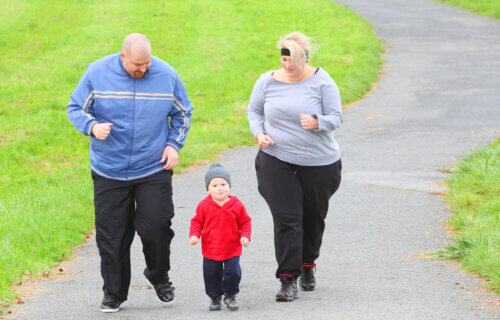TROMSØ, Norway — Gee thanks mom and dad! New research reveals individuals are six times more likely to become obese during middle age if both of their parents lived with obesity at the same age. Even if just one parent was obese, the risk still increases three-fold.
“Previous research shows a strong association between parents’ and their children’s obesity status but few studies have investigated whether this intergenerational transmission of obesity continues past adolescence and into adulthood,” says lead researcher Mari Mikkelsen, from the Department of Community Medicine at UiT Arctic University of Norway in Tromsø, in a media release.
“We were interested in how parents’ BMI is related to their offspring’s BMI when the offspring is well into adulthood and has lived away from home for a long time.”
Study authors used data originally gathered by the Tromsø Study, an-ongoing population-based health study. The analysis included participants between 40 and 59 years-old while participating in the seventh wave of the Tromsø Study (carried out in 2015-2016), as well as parents who took part in the fourth wave of the Tromsø Study (1994-1995). In all, the study featured 2,068 parent-offspring trios.
Analyses examining height and weight data displayed a robust association between parents’ BMI in middle age (ages 40-59) and the BMI of their offspring at the same age. More specifically, offspring BMI increased by 0.8 units for every four-unit increase (one standard deviation) in the mother’s BMI and by 0.74 units for every 3.1 unit increase in the father’s BMI.

Importantly, strong links were also seen connecting parents’ obesity status in middle age and the obesity status of their offspring at the same age. If both parents had obesity (BMI ≥ 30 kg/m2) in middle age, their kids had six times higher odds of living with obesity themselves upon entering middle age, in comparison to adults with both parents in the normal weight range (BMI 18.5-24.9 kg/m2).
Obesity risk also increased if just one parent lived with obesity. If only mom lived with obesity, her children had 3.44 times higher odds of living with obesity themselves. For fathers, the risk was 3.74 times higher. Researchers were sure to adjust these findings for the child’s sex, as well as for parents’ and child’s age, education, and physical activity levels.
“From previous studies we know that several factors contribute to the shared obesity status between parents and their children. Genes play an important role by affecting our susceptibility to weight gain and influence how we respond to obesogenic environments in which it can be easy to eat unhealthily,” Mikkelsen explains.
“Some studies also speculate that children tend to develop similar dietary and exercise habits to their parents when they all live together under the same roof, resulting in a similar BMI status. Obesity in childhood, and especially in adolescence, tends to follow the individual into early adulthood and so we suspected it would also follow them into middle age.”

“We found that this is indeed the case – children whose parents lived with obesity are much more likely to be in living with obesity themselves when they are in their 40s and 50s, long after they have left home,” she continues. “It can’t be established from our analyses whether this is due to genes or environment but we are most likely looking at a combination of the two.”
“Whatever the explanation, our finding that obesity that is transmitted between generations can persist well into adulthood underlines the importance of treating and preventing obesity, a condition that contributes significantly to ill health and premature death. It also lays the foundation for research into factors that influence the intergenerational transmission of obesity and that can be targeted to prevent offspring from spending their whole life affected by obesity.”
This research will be presented at the European Congress on Obesity (ECO 2024) in Venice from May 12-15.
You might also be interested in:



